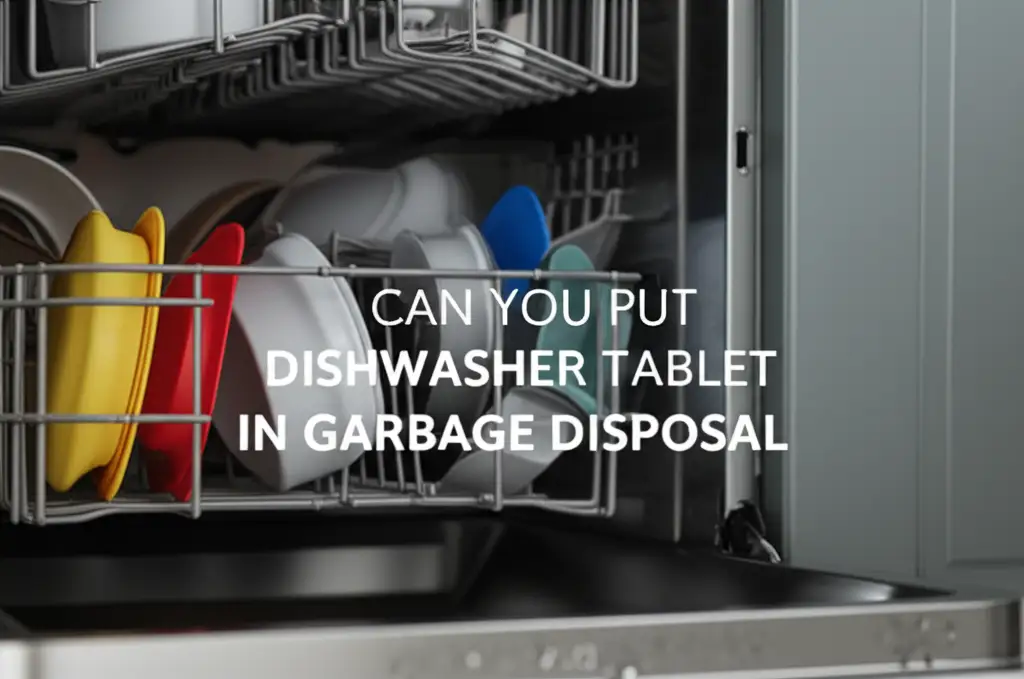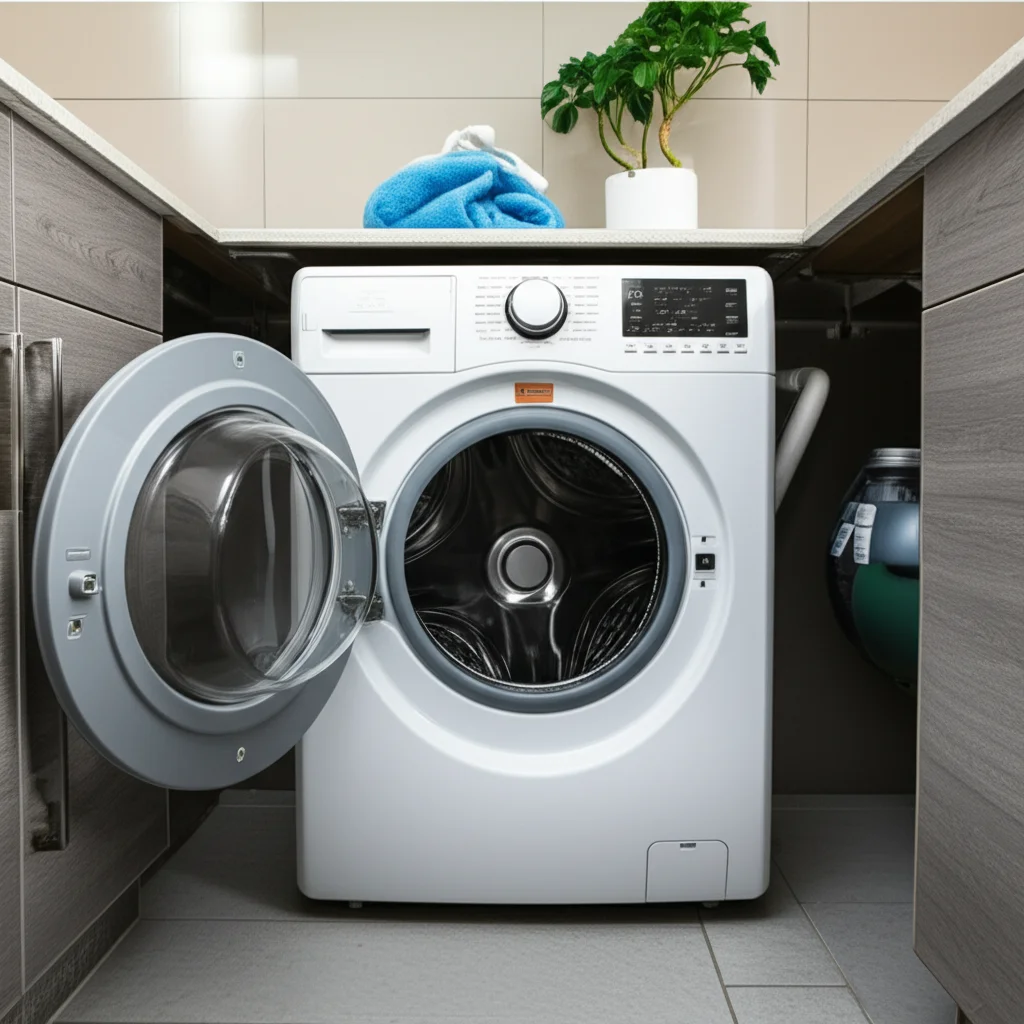· Katria Melrose · Home Maintenance · 17 min read
Can You Put Dishwasher Tablet In Garbage Disposal

Dishwasher Tablets in Disposal: Is It Safe?
Your kitchen garbage disposal unit handles a lot of food waste. Sometimes, it develops unpleasant odors or seems a bit sluggish. Many homeowners look for quick fixes to clean and freshen their disposals. A common question that comes up is, “Can you put a dishwasher tablet in garbage disposal?” It is an interesting thought, given how powerful these tablets are for cleaning dishes. I understand why someone might consider it a convenient solution. This article explores the wisdom of using dishwasher tablets in your disposal. We will examine what dishwasher tablets are, how garbage disposals work, and the potential outcomes of mixing the two. We will also look at safer, more effective ways to maintain a clean and odor-free kitchen drain.
Takeaway
- Avoid putting dishwasher tablets directly into your garbage disposal.
- Dishwasher tablets are designed for different conditions and can harm disposal components.
- The concentrated chemicals may cause corrosion or leave residues.
- Safe alternatives like ice cubes, citrus peels, baking soda, and vinegar clean and deodorize effectively.
- Regular maintenance prevents most disposal issues.
Clear Answer
You should not put a dishwasher tablet in your garbage disposal. Dishwasher tablets are formulated for dishwasher machines, not disposal units. Their concentrated chemicals, high alkalinity, and unique dissolving properties can potentially damage the disposal’s rubber seals, motor, or blades, leading to clogs or impaired function.
Understanding Dishwasher Tablets: What They Contain
Dishwasher tablets are powerful cleaning agents. They are engineered to clean food residue from dishes inside a dishwasher machine. These tablets contain a blend of chemicals, each serving a specific purpose. Knowing these ingredients helps us understand why they might not be suitable for a garbage disposal.
The Chemical Composition
Dishwasher tablets typically feature several key components. They often contain enzymes. These enzymes break down tough food particles like proteins and starches. Strong cleaning agents are also present. These agents are usually highly alkaline detergents. They help to cut through grease and grime. Most tablets also include bleaching agents. These chemicals help remove stains and whiten dishes. Finally, they have water softeners. These prevent mineral buildup in the dishwasher and on dishes.
How Tablets Dissolve and Work
Dishwasher tablets dissolve slowly in hot water. They release their chemicals over the course of a wash cycle. This controlled release is crucial for their effectiveness. The chemicals work in specific concentrations and temperatures within the dishwasher. The dishwasher’s water circulation system ensures even distribution. This process helps to thoroughly clean dishes without harming the appliance. Their design is very different from what a garbage disposal needs.
The unique formulation of these tablets is for a specific environment. The high heat and consistent water flow in a dishwasher activate the chemicals correctly. This ensures efficient cleaning. This environment also helps to dilute the powerful agents safely. My experience shows that using a product outside its intended purpose often leads to unexpected problems.
The Mechanics of Your Garbage Disposal: How It Operates
A garbage disposal unit is a robust kitchen appliance. It is designed to shred food waste into small particles. These particles then wash down the drain with water. Understanding its operation helps explain why some cleaning methods are better than others.
Key Components and Function
Your garbage disposal sits under your sink. It has a motor that spins a plate inside a grinding chamber. This plate has impellers, which are small lugs. They push food waste against a grinding ring. The grinding ring is stationary and has sharp edges. It grinds the food into tiny pieces. Water from the faucet flushes these particles down the drain. The disposal also has rubber seals and gaskets. These prevent leaks and reduce noise.
The grinding process is mechanical. It relies on physical force and water flow. It does not use chemical reactions for cleaning. The disposal unit is built to withstand food debris, not harsh chemical dissolution. Proper functioning requires clear pathways and undamaged internal parts. I always remind people that preventative care is simpler than dealing with a clog. Knowing how to clean your garbage disposal is essential for its longevity.
Differences from a Dishwasher
A garbage disposal is very different from a dishwasher. A dishwasher uses hot water, soap, and jets to clean dishes. It has a pump system that circulates water. The interior is designed to handle soapy water for an extended period. A garbage disposal, however, processes solid waste quickly. It uses mechanical grinding. It handles a sudden rush of water, but not prolonged exposure to strong chemical solutions.
The materials used in a disposal are different from those in a dishwasher. Dishwashers have stainless steel interiors and specialized hoses. Disposals often have rubber and plastic components in addition to metal. These materials can react differently to concentrated chemicals. Putting a dishwasher tablet in your disposal is like trying to use a screwdriver as a hammer; it might work once, but it is not what it is made for and can cause damage. Regular maintenance, such as understanding how to clean a smelly garbage disposal, helps prevent issues before they start.
Why People Consider Dishwasher Tablets for Disposals: Addressing Odors and Buildup
It is common for garbage disposals to develop unpleasant smells. This happens when food particles accumulate inside the grinding chamber. Grease and food debris can cling to the walls and blades. Over time, bacteria grow on these residues, producing foul odors. People often look for simple ways to eliminate these smells.
The Lure of a Quick Fix
Dishwasher tablets are known for their powerful cleaning action. They cut through grease and remove tough stains in dishwashers. This effectiveness makes them seem like a perfect solution for a smelly disposal. Many homeowners think a tablet could easily dissolve the gunk and freshen the drain. The idea is that the enzymes and detergents in the tablet will break down the food buildup. They hope it will leave the disposal clean and smelling fresh. It is a logical jump to make if you are just looking for a powerful cleaner.
Addressing Grease and Food Residue
Food waste, especially greasy items, can coat the interior of the disposal. This creates a sticky film where bacteria thrive. Dishwasher tablets contain degreasing agents. These agents are designed to emulsify fats and oils. People might believe these properties could help wash away grease buildup from the disposal’s grinding chamber. They think a tablet would scour the internal components, much like it cleans dishes. The thought is that the tablet would leave no residue behind. This perception drives the consideration of using them in a disposal. While the intention to clean is good, the method can be risky. There are much safer ways to tackle these common problems.
The Risks and Downsides: What Can Go Wrong?
While the idea of a sparkling clean and fresh-smelling disposal from a dishwasher tablet might seem appealing, there are significant risks involved. Using a product outside its intended purpose often leads to unintended consequences. These issues can range from minor annoyances to costly repairs.
Potential Damage to Components
Dishwasher tablets contain strong, concentrated chemicals. These chemicals are designed to be highly effective in the controlled environment of a dishwasher. However, when introduced into a garbage disposal, they can be problematic. The caustic nature of some detergents can corrode metal parts over time. More immediately, the rubber seals and gaskets within the disposal are vulnerable. Strong chemicals can degrade these rubber components, leading to leaks. A leak under your sink can cause water damage to cabinets and floors. It also creates a breeding ground for mold.
Furthermore, the detergents can strip away necessary lubrication. This may lead to increased friction for the motor. This potentially reduces the lifespan of the appliance. My advice is always to prioritize the health of your appliance. A ruined seal or a burnt-out motor is a much bigger headache than a lingering odor.
Clogging and Residue Buildup
Dishwasher tablets often have binders and fillers. These components help the tablet hold its shape and dissolve slowly. In a dishwasher, these elements wash away with large volumes of water. In a garbage disposal, the water flow is less controlled and often not as hot or prolonged. The tablet may not dissolve completely. Undissolved pieces can lodge in the drain trap or pipes. This can create a significant clog.
Even if the tablet dissolves, the concentrated, sudsy residue can create problems. These residues can cling to the grinding chamber walls or pipes. Over time, this sticky film can trap more food particles. This actually worsens the odor problem instead of solving it. It can also lead to more persistent clogs. Proper sink disposal cleaning methods avoid this kind of residue.
Plumbing System Concerns
The chemicals released by a dishwasher tablet are very concentrated. When flushed down your drain, they enter your home’s plumbing system. These chemicals can impact your pipes, especially older ones made of certain materials. They might cause accelerated corrosion in some pipe types. This is particularly true if your plumbing includes older galvanized steel or cast iron sections.
For homes connected to septic systems, the issue is even more critical. The strong chemicals in dishwasher tablets can kill the beneficial bacteria in a septic tank. These bacteria are vital for breaking down waste. A damaged septic system can lead to costly repairs and environmental issues. Protecting your entire plumbing system should always be a priority. Using the wrong products can have far-reaching negative effects.
Safer Alternatives for Cleaning and Freshening Your Disposal
Fortunately, many safe and effective methods exist to clean and deodorize your garbage disposal. These alternatives use common household items. They avoid the risks associated with harsh chemicals or inappropriate cleaning agents.
Ice and Citrus Peels: The Natural Scrubber
This is one of the most popular and effective methods. Start by running cold water down the disposal. Then, drop in a handful of ice cubes. The ice hardens any grease or food residue on the grinding elements. As the disposal grinds the ice, these hard particles scrape away the gunk. It is like a natural scouring agent.
After the ice, add citrus peels. Lemon, lime, or orange peels work well. The essential oils in the citrus peels provide a fresh, natural scent. Run the disposal again with cold water. The peels get ground up, releasing their aroma. This method cleans, sharpens the grinding elements slightly, and eliminates odors. It is simple, safe, and works wonders. I use this method regularly, and my disposal always smells fresh. You can find more details on how to clean your garbage disposal with lemon.
Baking Soda and Vinegar: The Foaming Power
Baking soda and vinegar create a fizzing reaction. This reaction helps to lift and dislodge grime. First, pour half a cup of baking soda into the disposal drain. Let it sit for about 15-30 minutes. This allows the baking soda to absorb odors. Baking soda is a natural deodorizer.
Next, pour a cup of white vinegar down the drain. The mixture will fizz vigorously. This foam helps to scrub the inside of the disposal. Let it sit for another 15-30 minutes. Finally, flush the disposal with hot water. For persistent odors, you can follow this with very cold water while running the disposal. This combination is effective for both cleaning and deodorizing. It is also completely safe for your plumbing. Explore more on how to clean your disposal with baking soda.
Specialized Disposal Cleaners
If you prefer a commercial solution, there are products specifically designed for garbage disposals. These cleaners often come in foam or tablet form. They are formulated to be safe for disposal components and plumbing. They contain enzymes that break down food waste and grease. Always follow the manufacturer’s instructions carefully when using these products.
These specialized cleaners target the specific issues of a garbage disposal. They provide a safe and effective way to maintain cleanliness. They are a good option if natural methods do not fully resolve stubborn issues. My recommendation is to try the natural methods first. They are usually all you need.
Best Practices for Garbage Disposal Maintenance
Keeping your garbage disposal in top condition prevents most problems. Regular maintenance extends its lifespan and ensures it operates efficiently. Simple habits can make a big difference.
Regular Flushing and Usage
The simplest maintenance tip is to use your disposal regularly. Even if you do not have much food waste, run it with cold water for 30 seconds every few days. This prevents rust and keeps the internal components moving freely. Always use plenty of cold water when operating the disposal. Cold water helps to solidify grease. Solid grease then gets chopped up and flushed away instead of coating the pipes. Running cold water for about 15 seconds before and after grinding also helps. This ensures all food particles wash down the drain.
Avoid putting certain items down the disposal. These include fibrous foods like celery stalks or corn husks. Hard items like fruit pits or bones can also cause damage. Grease and oil should never go down the disposal. They solidify in pipes and lead to clogs. Being mindful of what goes in is critical for problem prevention.
Deep Cleaning Routines
Beyond daily flushing, perform a deeper cleaning every few weeks. This helps to remove any accumulated grime and odors. The ice and citrus method is excellent for this. You can also use the baking soda and vinegar method. These routines tackle the sticky buildup that causes most odors. They also help to keep the grinding elements clear.
Some people like to use a stiff brush to clean the rubber splash guard. Food particles can get trapped underneath it. Remove the splash guard if possible and clean it thoroughly with dish soap and water. A clean splash guard prevents odors from lingering. A consistently clean disposal smells better and works better. My own kitchen routine includes these cleaning steps, and it makes a noticeable difference. Regular deep cleaning is key to a hygienic kitchen.
Professional Inspections
For long-term health, consider a professional inspection every few years. A plumber can check for wear and tear, potential leaks, or subtle clogs. They can also ensure proper connection to your plumbing system. Early detection of issues can prevent major breakdowns. This is especially true if you notice recurring issues like persistent odors or slow draining.
Professional help is invaluable for complex problems. They can clear stubborn clogs that household remedies cannot fix. They also provide advice specific to your home’s plumbing system. An expert eye helps maintain your disposal’s efficiency. They ensure your kitchen remains a clean and functional space. Knowing how to clean your disposal is helpful, but sometimes a professional is needed.
When to Seek Professional Help
While many garbage disposal issues are solvable with DIY methods, some problems require a professional plumber. Knowing when to call an expert can save you time, money, and further damage to your appliance or plumbing.
Persistent Clogs and Jams
If your garbage disposal hums but does not grind, it likely has a jam. You can often clear this yourself using the reset button or an Allen wrench. If the disposal does not turn on at all, check the circuit breaker. However, if a jam persists after several attempts, or if the disposal frequently clogs, it is time for professional help. A persistent clog might be deeper in your plumbing system than the disposal itself. A plumber has specialized tools to identify and clear these stubborn blockages. They can assess if the issue is within the disposal unit or further down the drainpipe.
Leaks and Water Damage
Any sign of water leaking from your garbage disposal is a serious issue. Leaks can occur from the seals, the sink flange, or connections to the dishwasher or drainpipe. Small drips can lead to significant water damage over time. This includes warped cabinets, mold growth, and structural damage. If you notice water pooling under your sink, disconnect the power to the disposal immediately. Then, call a plumber. They can accurately diagnose the source of the leak. They can also perform necessary repairs or replacements. Attempting to fix a complex leak yourself often worsens the problem.
Unusual Noises or Malfunctions
Your garbage disposal should run with a consistent grinding noise. If you start hearing new, unusual sounds, it is a warning sign. These can include loud banging, screeching, or grinding metal noises. Such sounds might indicate a foreign object is lodged in the grinding chamber. It could also mean a motor problem or worn-out grinding components. If the unit makes a loud noise but does not grind, or if it stops working entirely, professional help is usually needed. Ignoring these symptoms can lead to total unit failure. A plumber can safely inspect the internal mechanisms and identify the root cause of the malfunction. Prompt action can often prevent a complete replacement of the unit.
Frequently Asked Questions (FAQ)
Is it safe to put a dishwasher pod in garbage disposal?
No, it is not safe to put a dishwasher pod in your garbage disposal. Dishwasher pods contain concentrated chemicals and binders. These are designed for the high-temperature, circulating environment of a dishwasher. They can damage the disposal’s rubber seals, motor, or blades. They may also cause clogs in your drainpipes by not fully dissolving or leaving sticky residues.
What happens if you put a dishwasher tablet in the sink?
Putting a dishwasher tablet directly in the sink, especially without proper dilution and flushing, can be risky. The concentrated chemicals can be harsh on sink materials, particularly if your sink is not stainless steel. Residues might stick to the sink surface. The tablet will also not effectively clean or deodorize the disposal this way.
How often should I clean my garbage disposal?
You should clean your garbage disposal regularly to prevent odors and buildup. A light cleaning with cold water and ice cubes or citrus peels should be done weekly. A deeper cleaning using baking soda and vinegar is recommended monthly. Consistent care prevents most issues and keeps your kitchen fresh.
What should I not put in my garbage disposal?
Avoid putting fibrous foods like celery, onion skins, or corn husks in your disposal. Do not dispose of coffee grounds, pasta, rice, or potato peels, as they can expand and cause clogs. Grease, oil, and fat should never go down, as they solidify and create blockages. Bones, fruit pits, and other hard items can also damage the blades.
Can dishwasher detergent harm plumbing?
Concentrated dishwasher detergent, especially from tablets or pods, can potentially harm plumbing. Its high alkalinity and strong chemicals can corrode certain pipe materials over time, particularly older ones. For homes with septic systems, these chemicals can disrupt the beneficial bacteria, leading to septic system issues.
Are there specific products for cleaning garbage disposals?
Yes, there are specialized cleaning products made specifically for garbage disposals. These often come in foam or tablet form and contain enzymes designed to break down food waste and grease safely. They are formulated to be compatible with disposal components and plumbing systems, offering a safe alternative to harsh household cleaners.
Conclusion
Using a dishwasher tablet in your garbage disposal might seem like a clever hack for cleaning and odor control. However, as we have explored, this approach carries notable risks. Dishwasher tablets are designed for a different environment and their concentrated chemicals can corrode components, create clogs, or even damage your plumbing system. Your garbage disposal is a durable appliance, but it requires specific care tailored to its design.
Thankfully, you have many safer and more effective methods for maintaining a clean and fresh-smelling disposal. Simple household items like ice cubes, citrus peels, baking soda, and vinegar provide excellent, risk-free solutions. Regular flushing with cold water and being mindful of what goes down the drain also play crucial roles in preventing issues. Prioritizing proper garbage disposal maintenance not only keeps your kitchen pleasant but also extends the life of your appliance. Choose smart, safe cleaning practices to ensure your kitchen disposal remains in top working order. If you have any doubts or persistent problems, always consult a plumbing professional.
- garbage disposal
- dishwasher tablet
- kitchen cleaning
- home maintenance
- smelly disposal
- drain cleaning
- plumbing safety




